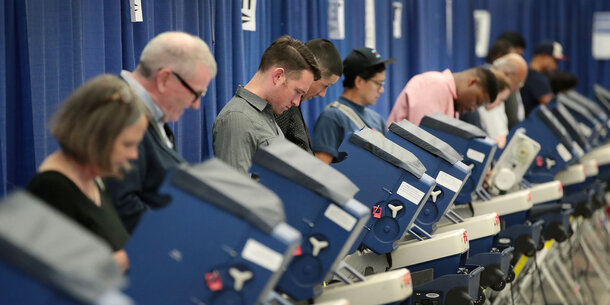This originally appeared in the Washington Post
By the Brennan Center for Justice’s count, state lawmakers have introduced more than 360 voter suppression bills across the nation, and the aim seems clear: Despite rhetorical nods to protecting “election integrity,” it’s a collective Republican effort to suppress the vote in future elections. As Stacey Abrams, the former Democratic minority leader of the Georgia state House explains, these bills “are responding to the big lie, to the disproven, discredited and, sadly, the blood-spilled lie of voter fraud.”
But not only are states trying to restrict access to the ballot box, in many instances, they’re also trying to make it harder for voters to protect their rights in court.
A new Brennan Center analysis identified at least 93 bills in 26 states introduced this year that threaten judicial independence by limiting courts’ power or injecting more politics into state judiciaries. According to the analysis, in at least eight of these states, bills have specifically targeted election-related cases. And in 21 states, broader court bills were introduced that would impact election cases, among others, by changing how judges are selected, which courts hear cases challenging the constitutionality of state actions or how judicial decisions are enforced. It’s a dangerous trend that leaves voting rights at risk and undermines a critical check against abuses of power during our elections.
In 2020, courts played a critical role ensuring meaningful access to the ballot during the pandemic and preventing government officials with partisan — and sometimes nakedly racial — motivations from trying to skew or overturn elections. In Pennsylvania, for example, the state Supreme Court extended the deadline for returning mail ballots in response to U.S. Postal Service delays, prompting claims by Republican lawmakers that an “activist court” was “allowing one party to steal this election.” Election rulings like these are making the courts a target now for partisan retaliation and manipulation.
In Georgia, where voters of color experience longer wait times at the polls, the voter suppression bill recently signed by Republican Gov. Brian Kemp includes a provision that makes it more difficult for a judge to expand polling place hours — something courts did in recent elections after power outages, delayed openings and other logistical challenges at specific polling places.
In Kansas, Republican lawmakers enacted a bill in May over the Democratic governor’s veto that prohibits state courts from altering the state’s election laws — a provision that would make it harder for judges to accommodate voters in situations involving a pandemic or a natural disaster.
In Texas, Republican lawmakers have pushed a bill that would change which judges hear certain election-related cases. The measure would disqualify judges from hearing cases involving an election official in their own geographic area — a move that appears targeted at shutting out judges elected in Democratic-leaning parts of the state. The bill gives the region’s presiding judge, who is appointed by the state’s Republican governor, the power to pick a judge to hear these challenges instead.
State courts have also been a target in Kentucky, where a law containing some positive measures to expand voter access was enacted in April with bipartisan support. But that new law contains language which says that only the state legislature may “suspend or revise any statute pertaining to elections” — which could be used to try to stop courts from striking down unconstitutional election laws.
Beyond measures that specifically take aim at courts’ election-related powers, other bills appear to be targeted at discouraging courts from wading into democracy-related cases. In Pennsylvania, the Republican-controlled General Assembly is considering a proposed constitutional amendment that would require the state’s appellate judges, who currently run in statewide elections, to run in districts. This would open the door to judicial gerrymandering, enabling lawmakers to oust judges by drawing districts along partisan lines. This proposal gained momentum after Pennsylvania courts heard a number of election-related lawsuits in 2020, including the state high court’s ruling on mail ballots. (Proponents missed the opportunity to put this amendment before voters on the May primary ballot, but there is still time for it to be placed on the November ballot.)
And in Tennessee, a Nashville judge’s decision expanding access to absentee voting last year because of the pandemic prompted a resolution that would have begun formal proceedings to consider her removal. When that effort failed, the Republican-controlled legislature — still intent on avoiding decisions like the one issued by the judge in Nashville — sought to create a new statewide court to hear constitutional challenges. A watered-down version of this bill, which requires three judges from different parts of the state to hear cases, was just sent to the governor for his signature. The idea, according to Republican state Sen. Mike Bell, is to dilute the power of judges “elected by the most liberal constituency in the state.”
These bills mean that voters, frequently Black and Latino, are being hit with a one-two punch: efforts that attempt to suppress their votes while also suppressing their ability to fight back using the legal system.
One essential function of state courts is guarding against legislative efforts to undermine democracy. In 2020, courts in several states played exactly that role. But if legislatures get away with neutering state courts, it will be more difficult in future elections for our democracy to be restored when threatened.




